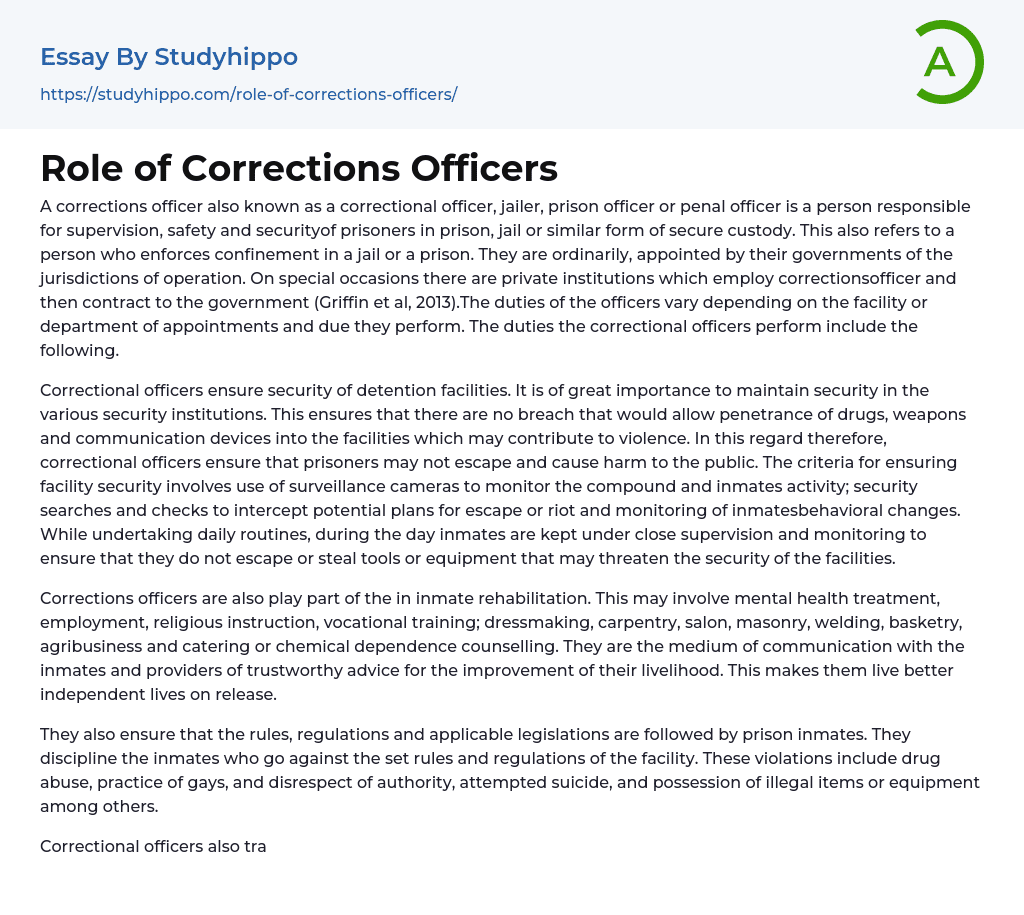A corrections officer also known as a correctional officer, jailer, prison officer or penal officer is a person responsible for supervision, safety and securityof prisoners in prison, jail or similar form of secure custody. This also refers to a person who enforces confinement in a jail or a prison. They are ordinarily, appointed by their governments of the jurisdictions of operation. On special occasions there are private institutions which employ correctionsofficer and then contract to the government (Griffin et al, 2013).The duties of the officers vary depending on the facility or department of appointments and due they perform. The duties the correctional officers perform include the following.
Correctional officers ensure security of detention facilities. It is of great importance to maintain security in the various security institutions. This ensures that there are no breach that would allow penetrance of drugs, weapons and commun
...ication devices into the facilities which may contribute to violence. In this regard therefore, correctional officers ensure that prisoners may not escape and cause harm to the public. The criteria for ensuring facility security involves use of surveillance cameras to monitor the compound and inmates activity; security searches and checks to intercept potential plans for escape or riot and monitoring of inmatesbehavioral changes. While undertaking daily routines, during the day inmates are kept under close supervision and monitoring to ensure that they do not escape or steal tools or equipment that may threaten the security of the facilities.
Corrections officers are also play part of the in inmate rehabilitation. This may involve mental health treatment, employment, religious instruction, vocational training; dressmaking, carpentry, salon, masonry, welding, basketry, agribusiness and catering or chemical dependence counselling. They ar
the medium of communication with the inmates and providers of trustworthy advice for the improvement of their livelihood. This makes them live better independent lives on release.
They also ensure that the rules, regulations and applicable legislations are followed by prison inmates. They discipline the inmates who go against the set rules and regulations of the facility. These violations include drug abuse, practice of gays, and disrespect of authority, attempted suicide, and possession of illegal items or equipment among others.
Correctional officers also transport inmates to courts and transfer them to other correctional facilities. In cases of prison renovations, relocation or transfer of inmates across prisons is conducted by corrections officers. They also involve in official responsibilities like court appearances and medical appointments for the inmates.
They also offer inmate security in theirfacilities. They offer tactical approach response to riots, hostage situations and other emergence situations in the prison. In some instances, pressures of imprisonment may lead to depression, anger or feeling of hopelessness. They are thus responsible to offering assistance to such emergence situations arising from those psychological experiences which may turn up violent or suicidal (Frank, 2008). The segregation of inmates to protect the safety of others, protect inmates that are at a risk of assault from others, victimized or targets of assassinations. This ensue that inmates area able to.
They maintain a record of equipment, supplies and other items, maintain and demonstrate proficiency in the use and care of firearms, restraint methods and equipment and emergence measures; maintain knowledge of communication and other electronic equipment; instruct inmates in proper care and use of institutional equipment: folk, grass-cutters, sewing machines and masonry tools.
Penal officers have a principal
responsibility of manning institutions to ensure the security of their team. Regardless of their jurisdiction and or position, they have to follow stipulated protocol to avoid endangering other officers. These protocols are instilled in them and effected in such a way that they will limit harm to staff. Frequent searching of the prison premises to isolate and or confiscate potential weapons also helps ensure team safety. This ensures that inmates do not come into contact with objects that may endanger the security of officers either through causing injury or death.
Conclusion
In consideration of the roles of corrections officers discussed above, their roles of are diverse. They seek to protect the each stakeholder in the institutions. Their roles are paramount in the rehabilitation of individuals in custody. It is a site where characters are shaped and molded into better beings. Inmates acquire vocational skills that help them outside the walls of prison. They learn principles of good living and virtues that are necessary for the wellbeing of the society.
References
- Frank E. Hagan; Introduction to Criminology: Theories, Methods and Criminal Behaviour (6thEd.) Sage Publishers,2008,
- Griffin, M. L., Hogan, N. L., & Lambert, E. G. (2013). Career stage theory and turnover intent among correctional officers. Criminal Justice and Behavior, 0093854813503638.
- Animal Cruelty essays
- Charles Manson essays
- Crime Prevention essays
- Crime scene essays
- Criminal Justice essays
- Criminology essays
- Cyber Crime essays
- Damages essays
- Detention essays
- Distracted Driving essays
- Drug Trafficking essays
- Drunk Driving essays
- Forensic Science essays
- Gang essays
- Hate Crime essays
- Homicide essays
- Identity Theft essays
- Juvenile Crime essays
- Juvenile Delinquency essays
- Juvenile Justice System essays
- Law Enforcement essays
- Murder essays
- Organized Crime essays
- Penology essays
- Piracy essays
- Prison essays
- Property Crime essays
- Prostitution essays
- Punishment essays
- Punishments essays
- Rape essays
- Robbery essays
- Serial Killer essays
- Sexual Assault essays
- Sexual Assault on College Campuses essays
- Sexual Harassment essays
- Sexual Offence essays
- Stealing essays
- Surveillance essays
- Ted Bundy essays
- Victim essays
- Violent crime essays
- White Collar Crime essays
- Adaptation essays
- Adventure essays
- Adversity essays
- Aging essays
- Alcohol essays
- Barbie Doll essays
- Beauty essays




